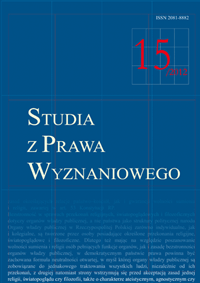Autonomia kościołów i innych związków wyznaniowych we współczesnym prawie polskim
The Autonomy of Churches and Other Religious Organizations in Contemporary Polish Law
Author(s): Paweł BoreckiSubject(s): Law, Constitution, Jurisprudence
Published by: Katolicki Uniwersytet Lubelski Jana Pawła II - Wydział Prawa, Prawa Kanonicznego i Administracji
Keywords: freedom of conscience and religion; churches and other religious organizations; the Constitution of the Republic of Poland
Summary/Abstract: The autonomy of religious organizations, or their capacity to lay down and be governed their own internal law (church law), is an ample indication of the collective freedom of conscience and denomination. This autonomy also typifies the system of separation between the state and religious communities. The 2 April 1997 Constitution of the Republic of Poland confers on religious communities the right to enjoy substantial autonomy. Its Article 25(3) reads that the relationship between the state and churches and other religious organizations are based on the principle of respect for their autonomy and the mutual independence of each in its own sphere, as well as on the principle of cooperation for the individual and common good. The author of this study analyses and interprets the aforesaid principle, referring to the doctrine of law and ecclesiastical legislation.
Journal: Studia z Prawa Wyznaniowego
- Issue Year: 2012
- Issue No: 15
- Page Range: 85-109
- Page Count: 25
- Language: Polish

